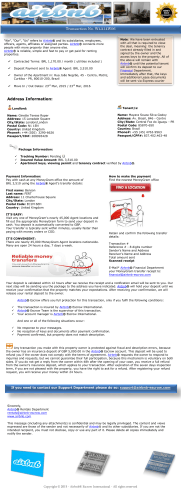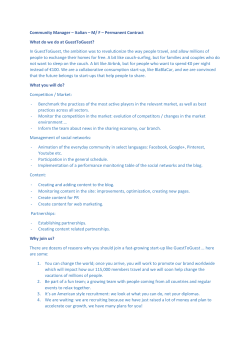
CV - Boston University
Davide Proserpio Contact Information 111 Cummington Mall, Room 136 Department of Computer Science Boston University Boston, MA 02215 USA E-mail: [email protected] Web: http://cs-people.bu.edu/dproserp Research My research seeks to empirically measure and quantify how digital information influences industries and markets. Most of my work is carried out by conducting empirical analyses using data collected from online marketplaces and leveraging concepts from computer science, statistics, and economics. Education Boston University, Boston, Massachusetts USA Ph.D. Candidate, Computer Science, June 2011 - Present • Advisor: Sharon Goldberg and John W. Byers Carlos III University, Madrid, Spain and Universitat Polit` ecnica de Catalunya, Barcelona, Spain M.S., Engineering, June, 2010 Politecnico di Milano, Milano, Italy B.A., Engineering, March, 2008 Honors and Awards Hariri Graduate Fellows Program 2015 The Hariri Graduate Fellows Program recognizes outstanding PhD graduate students who pursue computational and data-driven research at Boston University. SIGCOMM Travel Grant, 2013 Erasmus Mundus Scholarship, 2006 Academic Experiences Boston University, Department of Computer Science, Massachusetts USA Professional Experiences Microsoft Research Redmond Teaching Assistant for Probability in Computing Fall 2014 Duties at various times have included office hours, leading weekly discussions and preparing labs. Summer Intern Mentor: Scott Counts June 2015 - August 2015 Telefonica Research Barcelona Summer Intern June 2014 - August 2014 Project: financial credit score prediction using users mobile phone behavior data Mentors: Jose San Pedro and Nuria Olvier Working papers Proserpio, D. and Zervas, G. (2014). Online reputation management: Estimating the impact of management responses on consumer reviews1 [Job Market Paper] Abstract: Failure to meet a consumer’s expectations can result in a negative review, which can have a lasting, 1 A version of this paper appears in the Proceedings of the 16th ACM Conference on Economics and Computation (EC) 2015 (abstract-only publication to accommodate subsequent publication in journals). 1 damaging impact on a firm’s reputation, and its ability to attract new customers. To mitigate the reputational harm of negative reviews many firms now publicly respond to them. How effective is this reputation management strategy in improving a firm’s reputation? We empirically answer this question by exploiting a difference in managerial practice across two hotel review platforms, TripAdvisor and Expedia: while hotels regularly respond to their TripAdvisor reviews, they almost never do so on Expedia. Based on this observation, we use difference-in-differences to identify the causal impact of management responses on consumer ratings by comparing changes in the TripAdvisor ratings of a hotel following its decision to begin responding against a baseline of changes in the same hotel’s Expedia ratings. We find that responding hotels, which account for 56% of hotels in our data, see an average increase of 0.12 stars in the TripAdvisor ratings they receive after they start responding. Moreover, we show that this increase in ratings does not arise from hotel quality investments. Instead, we find that the increase is consistent with a shift in reviewer selection: consumers with a poor experience become less likely to leave a negative review when hotels begin responding. Zervas, G., Proserpio, D., and Byers, J. W. (2014). The rise of the sharing economy: Estimating the impact of airbnb on the hotel industry2 Abstract: A number of decentralized peer-to-peer markets, now colloquially known as the sharing economy, have emerged as alternative suppliers of goods and services traditionally provided by long-established industries. A central question surrounding the sharing economy regards its long-term impact: will peer-to-peer platforms materialize as viable mainstream alternatives to traditional providers, or will they languish as niche markets? In this paper, we study Airbnb, a sharing economy pioneer offering short-term accommodation. Combining data from Airbnb and the Texas hotel industry, we estimate the impact of Airbnb’s entry into the Texas market on hotel room revenue, and study the market response of hotels. To identify Airbnb’s causal impact on hotel room revenue, we use a difference-indifferences empirical strategy that exploits the significant spatiotemporal variation in the patterns of Airbnb adoption across city-level markets. We estimate that in Austin, where Airbnb supply is highest, the impact on hotel revenue is roughly 8-10%. We find that Airbnb’s impact is nonuniformly distributed, with lower-priced hotels, and hotels not catering to business travel being the most affected segments. Finally, we find that affected hotels have responded by reducing prices, an impact that benefits all consumers, not just participants in the sharing economy. Our work provides empirical evidence that the sharing economy is making inroads by successfully competing with, and acquiring market share from, incumbent firms. Zervas, G., Proserpio, D., and Byers, J. (2015a). A first look at online reputation on airbnb, where every stay is above average Abstract: Judging by the millions of reviews left by guests on the Airbnb platform, this “trusted community marketplace” is fulfilling its mission of matching travelers seeking accommodation with hosts who have room to spare remarkably well. Based on our analysis of ratings we collected for over 600,000 properties listed on Airbnb worldwide, we find that nearly 95% of Airbnb properties boast an average user-generated rating of either 4.5 or 5 stars (the maximum); virtually none have less than a 3.5 star rating. We contrast this with the ratings of approximately half a million hotels worldwide that we collected on TripAdvisor, where there is a much lower average rating of 3.8 stars, and more variance across reviews. Considering properties by accommodation type and by location, we find considerable variability in ratings, and observe that vacation rental properties on TripAdvisor have ratings most similar to ratings of Airbnb properties. Last, we consider several thousand properties that are listed on both platforms. For these cross-listed properties, we find that even though the average ratings on Airbnb and TripAdvisor are similar, proportionally more properties receive the 2 A version of this paper appears in the Proceedings of the 16th ACM Conference on Economics and Computation (EC) 2015 (abstract-only publication to accommodate subsequent publication in journals). 2 highest ratings (4.5 stars and above) on Airbnb than on TripAdvisor. Moreover, there is only weak correlation in the ratings of individual cross-listed properties across the two platforms. Our work is a first step towards understanding and interpreting nuances of user-generated ratings in the context of the sharing economy. Peer reviewed Economics conferences and Proserpio, D. and Zervas, G. (2015). Online reputation management: Estimating the impact of manjournals agement responses on consumer reviews. In Proceedings of the 16th ACM conference on electronic commerce. ACM Zervas, G., Proserpio, D., and Byers, J. W. (2015b). The impact of the sharing economy on the hotel industry: Evidence from airbnb’s entry in texas. In Proceedings of the 16th ACM conference on electronic commerce. ACM Computer Science San Pedro, J., Proserpio, D., and Oliver, N. (2015). Mobiscore: Towards universal credit scoring from mobile data. Proceedings of the 23rd conference on User Modeling, Adaptation and Personalization (UMAP) Proserpio, D., Goldberg, S., and McSherry, F. (2014). Calibrating data to sensitivity in private data analysis. Proceedings of the VLDB Endowment, 7(8) Ruchansky, N. and Proserpio, D. (2013). A (not) nice way to verify the openflow switch specification: formal modelling of the openflow switch using alloy. In Proceedings of the ACM SIGCOMM 2013 conference on SIGCOMM, pages 527–528. ACM Proserpio, D., Goldberg, S., and McSherry, F. (2012). A workflow for differentially-private graph synthesis. In Proceedings of the 2012 ACM workshop on Workshop on online social networks, pages 13–18. ACM Proserpio, D., Diaz-Sanchez, D., Almenarez, F., Marin, A., and Guerrero, R. (2011). Achieving iptv service portability through delegation. Consumer Electronics, IEEE Transactions on, 57(2):492–498 D´ıaz-S´ anchez, D., Almenarez, F., Mar´ın, A., Proserpio, D., and Arias Cabarcos, P. (2011). Media cloud: an open cloud computing middleware for content management. Consumer Electronics, IEEE Transactions on, 57(2):970–978 D´ıaz-S´ anchez, D., Sanvido, F., Proserpio, D., and Mar´ın, A. (2010). Dlna, dvb-ca and dvb-cpcm integration for commercial content management. Consumer Electronics, IEEE Transactions on, 56(1):79–87 Proserpio, D., Sanvido, F., Arias Cabarcos, P., Guerrero, R. S., Almen´arez-Mendoza, F., DiazSanchez, D., and Marin-Lopez, A. (2010). Introducing infocards in ngn to enable user-centric identity management. In Global Telecommunications Conference (GLOBECOM 2010), 2010 IEEE, pages 1–5. IEEE D´ıaz-S´ anchez, D., Proserpio, D., Mar´ın-L´opez, A., Almen´arez-Mendoza, F., and Weik, P. (2009). A general ims registration protocol for wireless networks interworking. Wireless and Mobile Networking, pages 32–43 Languages Italian (native), Spanish (bilingual), English (fluent) References 3 Sharon Goldberg, PhD Associate Professor of Computer Science Boston University email: [email protected] John Byers, PhD Professor of Computer Science Boston University email: [email protected] Georgios Zervas, PhD Assistant Professor of Marketing Questroom School of Business email: [email protected] Michael Luca, PhD Assistant Professor of Business Administration Harvard Business School email: [email protected] email (assistant): [email protected] Last updated: June 28, 2015 4
© Copyright 2026











